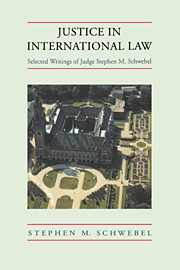Book contents
- Frontmatter
- Contents
- Preface
- PART I International Court of Justice
- PART II International Arbitration
- PART III United Nations
- 15 The Origins and Development of Article 99 of the Charter
- 16 The International Character of the Secretariat of the United Nations
- 17 Secretary-General and Secretariat
- 18 A United Nations “Guard” and a United Nations “Legion”
- 19 Mini-States and a More Effective United Nations
- 20 Article 19 of the Charter of the United Nations: Memorandum of Law
- 21 The United States Assaults the ILO
- 22 Goldberg Variations
- PART IV International Contracts and Expropriation
- PART V Aggression under, Compliance with, and Development of International Law
- List of publications
- Index
19 - Mini-States and a More Effective United Nations
Published online by Cambridge University Press: 06 November 2009
- Frontmatter
- Contents
- Preface
- PART I International Court of Justice
- PART II International Arbitration
- PART III United Nations
- 15 The Origins and Development of Article 99 of the Charter
- 16 The International Character of the Secretariat of the United Nations
- 17 Secretary-General and Secretariat
- 18 A United Nations “Guard” and a United Nations “Legion”
- 19 Mini-States and a More Effective United Nations
- 20 Article 19 of the Charter of the United Nations: Memorandum of Law
- 21 The United States Assaults the ILO
- 22 Goldberg Variations
- PART IV International Contracts and Expropriation
- PART V Aggression under, Compliance with, and Development of International Law
- List of publications
- Index
Summary
Fifty years ago, the First Assembly of the League of Nations demonstrated a higher sense of responsibility than did the General Assembly of the United Nations at its Twenty-Sixth Session, or at its preceding Sessions. The issue then was that of mini-States, an issue which has been very much with the United Nations for the last decade.
Liechtenstein was denied admission to the League by a vote which followed upon a report made to the Assembly. The report noted that:
Liechtenstein has been recognized de jure by many States. She has concluded a number of Treaties … The Principality of Liechtenstein possesses a stable Government and fixed frontiers … There can be no doubt that juridically the Principality of Liechtenstein is a sovereign State, but by reason of her limited area, small population, and her geographical position, she has chosen to depute to others some of the attributes of sovereignty … Liechtenstein has no army. For the above reasons, we are of the opinion that the Principality of Liechtenstein could not discharge all the international obligations which would be imposed on her by the Covenant.
In 1971, the General Assembly of the United Nations voted to admit Qatar to membership (along with Bahrain and Bhutan). The unanimous recommendation of the Security Council on which this action was based shows no signs of the judiciousness that characterized the League's proceedings of 1920. By 1920, Liechtenstein had been more or less independent for 200 years; by 1971, Qatar had been independent for some weeks. The population of Liechtenstein (not a United Nations Member any more than it was a League Member) is about 21,000; that of Qatar, about 80,000.
- Type
- Chapter
- Information
- Justice in International LawSelected Writings, pp. 326 - 336Publisher: Cambridge University PressPrint publication year: 1994



